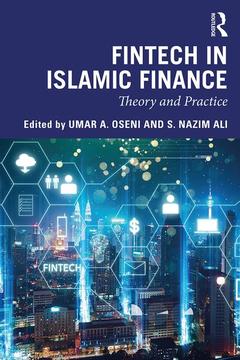Description
Fintech in Islamic Finance
Theory and Practice
Coordinators: Oseni Umar A., Ali S. Nazim
Language: English
Subjects for Fintech in Islamic Finance:
Keywords
Islamic Finance; Islamic law; Online Dispute Resolution Platforms; innovative fintech products; Bank Islam Malaysia Berhad; global Islamic finance industry; Conventional Financial Products; bitcoin trading; Blockchain Technology; Investment Account Platform; Dubai Islamic Bank; Islamic Bank; Fintech Start Ups; P2P Lending; Islamic Finance Industry; Islamic Financial Services Industry; Smart Contracts; Islamic Social Finance; Crowdfunding Platforms; Fintech Companies; Islamic Financial Institutions; IFSB; DIFC; Islamic Banking Industry; ODR System; Financing SMEs; Cash Waqf; DAO; Regulatory Sandbox; Islamic Financial Services
Publication date: 06-2019
· 15.6x23.4 cm · Paperback
Publication date: 06-2019
· 15.6x23.4 cm · Hardback
Description
/li>Contents
/li>Readership
/li>Biography
/li>
Featuring high-level analysis of Islamic law, this book examines fintech in Islamic finance from both theoretical and empirical perspectives. Whilst building on existing approaches, it also discusses the current application of fintech in promoting financial inclusion through innovative solutions in Muslim-majority countries, identifying future directions for policy-makers.
With original chapters written by prominent academics, senior lawyers and practitioners in the global Islamic finance industry, this book serves as the first standalone pioneering reference work on fintech in Islamic finance. It also, for the first time, examines the position of Islamic law on cryptocurrencies, such as bitcoin. Besides the conceptual analysis of the Shar??ah and legal aspects of fintech in Islamic finance, this book provides relevant case studies showing current and potential developments in the application of fintech in various sectors ranging from crowdfunding and smart contracts, to Online Dispute Resolution, Investment Account Platform and identity verification in the KYC process.
Setting the agenda for researchers in the field, Fintech in Islamic Finance will be useful to students and scholars of Islamic finance and financial technology.
Part 1: Introduction 1. Fintech in Islamic Finance: An Introduction Part 2: Fintech and Financial Intermediation 2. Fintech: The Opportunity for Islamic Finance 3. Implications of Technological Advance for Financial Intermediation in Islamic Finance 4. Fintech in Islamic Finance: From Collaborative Finance to Community-based Finance 5. Financial Intermediation, Fintech and Sharī‘ah Compliance 6. E-Commerce and Islamic Financial Intermediation Part 3: Setting the Shariʿah Parameters 7. Fintech in the Light of Maqāsid al-Sharī‘ah 8. Fintech and Islamic Finance: Setting the Shariʿah Parameters 9. Currency in Islamic Law: A Sharī‘ah Analysis of Bitcoin 10. Crowfunding in Islamic Finance: Ensuring Proper Shariʿah Oversight Part 4: Legal and Regulatory Issues 11. The Regulation of Fintech and Cryptocurrencies 12. Fintech in Islamic Finance: Business Models and the Need for Legal Solutions 13. Blockchain Technologies and the Prospects of Smart Contracts in Islamic Finance 14. The Potentials of Smart Contract in Islamic Trade Finance Part 5: Case Studies: From Concept to Application 15. The Emergence of Islamic Crowdfunding Platforms: A Case Study of Ethis Ventures 16. The Investment Account Platform: A Practical Application of Fintech in Malaysia 17. Integrating Waqf Crowdfunding into the Blockchain: A Modern Approach for Creating a Waqf Market 18. Blockdentity: A Future Beyond Digital identity 19. Banking on ICT: The relevance of online dispute resolution in the Islamic banking industry in Malaysia Part 6: Future Directions 20. Current and Future Impacts of Fintech in Islamic Finance
Umar A. Oseni is an Executive Director of the International Islamic Liquidity Management Corporation. He was an Associate Professor of Law and Regulation of Islamic Finance at the International Islamic University Malaysia.
S. Nazim Ali is Director of the Research Division of the College of Islamic Studies, at Hamad Bin Khalifa University. He was the Director of the Islamic Finance Project at Harvard University from 1995 to 2014.
These books may interest you

Islamic Fintech 160.25 €



